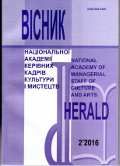MODERN COMPOSER CREATIVE ACTIVITY AS SUBJECT OF EDUCATION
DOI:
https://doi.org/10.32461/2226-3209.2.2016.138512Keywords:
modernity, composer creative activity, system of music education, individualism, pluralism, globalismAbstract
The purpose of the research – in the context of ideas about modern culture, which attributes are individualism, pluralism and globalism, to define specifics of music composer creative activity and in accordance with this – a place of the involvement to it in the system of music education. Methodological base of the work is philosophical-sociological studies of creativity as a single orienting point in the polarity of individualism-globalism by E. Toffler, N. Chomsky and M. Beardsley. Scientific novelty consists in the originality of presentation of the problem of academic music education as cardinal approach of the education subject to modern composer creative activity. Conclusions. The system of music education, in which modern composer creative activity must occupy the leading position in creative capabilities of a musician-professional, whose psychology is formed by individualism alternatives, choice and pluralism of means of communication with a sоciety is intended to correspond to the communication globalism of modern world.
Downloads
Published
Issue
Section
License
Authors who publish with this journal agree to the following terms:
1. Authors retain copyright and grant the journal right of first publication with the work simultaneously licensed under a Creative Commons Attribution License that allows others to share the work with an acknowledgement of the work's authorship and initial publication in this journal.
2. Authors are able to enter into separate, additional contractual arrangements for the non-exclusive distribution of the journal's published version of the work (e.g., post it to an institutional repository or publish it in a book), with an acknowledgement of its initial publication in this journal.
3. Authors are permitted and encouraged to post their work online (e.g., in institutional repositories or on their website) prior to and during the submission process, as it can lead to productive exchanges, as well as earlier and greater citation of published work (See The Effect of Open Access).


